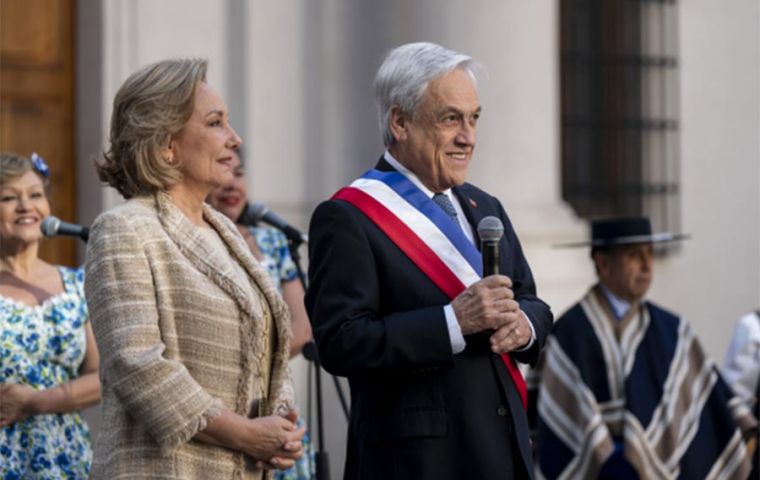MercoPress. South Atlantic News Agency
Piñera critical of opposition, clergy during Chile's National Holiday
 Piñera presided over the festivities marking Chile's national holiday.
Piñera presided over the festivities marking Chile's national holiday. Chile's President Sebastián Piñera criticised opposition leaders and members of the clergy alike Wednesday after the religious ceremony marking the country's National Holiday.
“There are times when all Chileans should feel like we are part of the same country,” said Piñera after the ecumenical Te Deum ceremony held at Santiago's Cathedral, in unspoken reference to the absence of the opposition parties' most prominent figures such as House Speaker Iván Flores and Deputy Speaker Loreto Carvajal (PPD) as well as Deputy Gabriel Silber (DC).
“I do not understand why some decide to exclude themselves, I think that does not do well, we must understand that beyond the legitimate differences there are times when all Chileans should feel like we are a part of the same country,” Piñera told reporters.
Asked about the many sex scandals involving the Chilean Catholic Church, Piñera believed “the only way to overcome this situation is to recognise them [the cases of abuse], by asking for forgiveness.”
”It is true, there have been too many complaints,“ Piñera went on. ”There have been too many [cases of] abuse and I believe that the only way to deal with this is with truth and justice and that is what the entire Chilean society expects, wants and will happen,” he added.
The humourous touch came when Piñera, standing in his cabriolet carriage for the customary trip from the presidential La Moneda to the Cathedral, plummeted down to his seat due to inertia and stood up again right afterwards.
Chile's National Holidays, commonly known as ‘The Eighteen’, commemorate the establishment in 1811 of a government junta which sparked the independence process leading to the
February 12, 1818, Act.
Up until 1823, the patriotic festivities were three: February 12, April 5, and September 18. That is, a celebration for each of the relevant dates during the emancipatory process, with the proclamation of independence, the battle of Maipú and the formation of the first national government junta, respectively. That is to say, since the beginning of the republic, “18” was considered a crucial date, even though its intention was not independence. But, on August 14, 1824, and with Ramón Freire as Supreme Director, the commemoration of April 5 was abolished and only February 12 and September 18 remained.
Freire's reason for eliminating the April 5 festivity was to promote the idea that work should prevail and that the population should get accustomed to fewer holidays.
“The holiday itself was not attacked, but the excess thereof, inherited from colonial times,” according to historian Paulina Peralta, thus giving the leading elite a tool to exert a stronger control over the masses and probably prevent social unrest.
But as historian Cristián Guerrero Lira points out, both April 5 and February 12 entailed a tribute to actions involving independence hero Bernardo O'Higgins, with whom Joaquín Prieto, Chile's President by 1837, were bitter enemies. Citing financial grounds and also invoking Lent's proximity, Prieto decreed September 18 was to be the nation's only holiday.




Top Comments
Disclaimer & comment rulesCommenting for this story is now closed.
If you have a Facebook account, become a fan and comment on our Facebook Page!